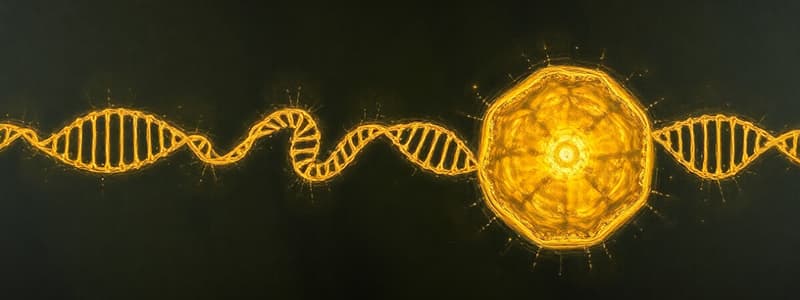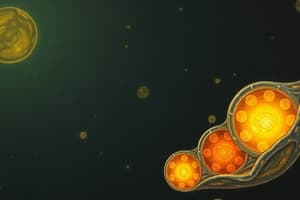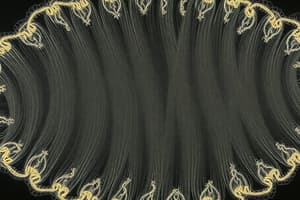Podcast
Questions and Answers
Which of the following is a consequence of excessive cyclin production?
Which of the following is a consequence of excessive cyclin production?
- Activation of p53
- Induction of apoptosis
- Uncontrolled cell division (correct)
- Inhibition of DNA replication
What is the role of p21 in the cell cycle?
What is the role of p21 in the cell cycle?
- Replicates DNA
- Activates cyclins
- Inhibits CDK/cyclin complexes (correct)
- Facilitates cell cycle progression
In cells with mutated p53, what is the likely outcome after exposure to high levels of radiation?
In cells with mutated p53, what is the likely outcome after exposure to high levels of radiation?
- Enhanced DNA repair mechanisms
- Increased apoptosis
- Normal cell cycle progression
- Failure to undergo apoptosis (correct)
What triggers programmed cell death when DNA damage is excessive?
What triggers programmed cell death when DNA damage is excessive?
What happens if defects in DNA replication are detected in the cell cycle?
What happens if defects in DNA replication are detected in the cell cycle?
What purpose does replication licensing serve during the cell cycle?
What purpose does replication licensing serve during the cell cycle?
Which phase of the cell cycle is characterized by an increase in DNA polymerase levels?
Which phase of the cell cycle is characterized by an increase in DNA polymerase levels?
What triggers the transition from G2 phase to the mitotic (M) phase?
What triggers the transition from G2 phase to the mitotic (M) phase?
Which of the following statements regarding cyclins is true?
Which of the following statements regarding cyclins is true?
What is the role of checkpoints in the cell cycle?
What is the role of checkpoints in the cell cycle?
In which phase do cells permanently exit the cell cycle?
In which phase do cells permanently exit the cell cycle?
What primarily controls the progression through the various phases of the cell cycle?
What primarily controls the progression through the various phases of the cell cycle?
What is the primary function of the S phase in the cell cycle?
What is the primary function of the S phase in the cell cycle?
What is the main function of CDK enzymes in the cell cycle?
What is the main function of CDK enzymes in the cell cycle?
Which phase of the cell cycle is primarily associated with DNA synthesis?
Which phase of the cell cycle is primarily associated with DNA synthesis?
What happens to the retinoblastoma (Rb) protein when it is phosphorylated by CDK4 or CDK6?
What happens to the retinoblastoma (Rb) protein when it is phosphorylated by CDK4 or CDK6?
During which checkpoint is the damage to DNA assessed before cell division can proceed?
During which checkpoint is the damage to DNA assessed before cell division can proceed?
What is the role of cyclins in the activation of CDK complexes?
What is the role of cyclins in the activation of CDK complexes?
What occurs at the M checkpoint during the cell cycle?
What occurs at the M checkpoint during the cell cycle?
Which of the following can disrupt cell cycle control, potentially leading to cancer?
Which of the following can disrupt cell cycle control, potentially leading to cancer?
What is characteristic of chromosomes during metaphase compared to interphase?
What is characteristic of chromosomes during metaphase compared to interphase?
Flashcards
Eukaryotic Cell Cycle
Eukaryotic Cell Cycle
The series of events that lead to DNA replication and cell division in cells with a nucleus (eukaryotic cells).
Interphase
Interphase
The phase of the cell cycle where the cell grows + replicates DNA.
Mitotic (M) Phase
Mitotic (M) Phase
The phase where the cell separates its DNA and divides its cytoplasm to form two cells.
S Phase
S Phase
Signup and view all the flashcards
G1 Phase
G1 Phase
Signup and view all the flashcards
G2 Phase
G2 Phase
Signup and view all the flashcards
Replication Licensing
Replication Licensing
Signup and view all the flashcards
Cell Cycle Checkpoints
Cell Cycle Checkpoints
Signup and view all the flashcards
What happens if a cyclin is produced excessively?
What happens if a cyclin is produced excessively?
Signup and view all the flashcards
How can CDK inhibitors impact cell division?
How can CDK inhibitors impact cell division?
Signup and view all the flashcards
What is p53's role in DNA damage?
What is p53's role in DNA damage?
Signup and view all the flashcards
How does p21 affect the cell cycle?
How does p21 affect the cell cycle?
Signup and view all the flashcards
What happens if checkpoints fail?
What happens if checkpoints fail?
Signup and view all the flashcards
G1 Checkpoint
G1 Checkpoint
Signup and view all the flashcards
S Checkpoint
S Checkpoint
Signup and view all the flashcards
G2 Checkpoint
G2 Checkpoint
Signup and view all the flashcards
M Checkpoint
M Checkpoint
Signup and view all the flashcards
What is G0 phase?
What is G0 phase?
Signup and view all the flashcards
CDK complexes
CDK complexes
Signup and view all the flashcards
Rb protein
Rb protein
Signup and view all the flashcards
Study Notes
Cell Cycle Overview
- Eukaryotic cells have a cell cycle divided into interphase and the mitotic (M) phase.
- Interphase is where the cell grows and copies its DNA.
- The mitotic (M) phase is where the cell separates its DNA into two sets and divides its cytoplasm, forming two new cells.
Eukaryotic Cell Cycle Stages
- G1 phase (Gap 1): The period before DNA replication.
- S phase (Synthesis): DNA replication occurs.
- G2 phase (Gap 2): Occurs before mitosis (M).
- G0 phase: Cells that have stopped dividing, like mature T lymphocytes, are out of the cell cycle. Quiescent cells can re-enter the G1 phase to resume division.
DNA Synthesis in S Phase
- DNA synthesis only occurs once per cell cycle and only during the S phase.
- Eukaryotic cells have control mechanisms for this, gene products governing transitions between phases.
- Cyclins are proteins changing in concentration at specific times. This cycle aspect gives them their name.
- Cyclin-dependent kinases (Cdks) are important proteins for regulating progression through the cell cycle.
- During S phase, nuclear DNA is completely replicated once. Chromatin is marked to prevent further replication until mitosis.
- Replication licensing is a process that ensures DNA is replicated only once per cycle.
Cell Cycle Checkpoints
- Cell cycle is controlled by checkpoints ensuring each phase completes correctly before the next.
- Key protein classes involved include cyclins and cyclin-dependent kinases (Cdks).
- G1 checkpoint: Checks for cell size, nutrients, growth factors, and DNA damage.
- S checkpoint: Checks for DNA synthesis being complete.
- G2 checkpoint: Checks for cell size, DNA replication, and damage.
- M checkpoint: Checks for chromosome spindle attachment.
CDK Enzymes and Checkpoints
- Kinases are a group of enzymes that move the cell to the next phase of the cell cycle.
- Kinases bind to cyclins to form a CDK complex.
- This complex phosphorylates a checkpoint protein that activates the protein and allows the cell cycle to continue.
- Checkpoint proteins are broken down after their role is done.
- Example: The D cyclins activate CDK4 and CDK6. These kinases are synthesized during G1 in actively dividing cells.
Retinoblastoma (Rb) Protein
- Rb is a substrate for CDK4 or CDK6.
- Rb binds to and inactivates a transcription factor (E2F).
- Phosphorylation of Rb by CDK4/6 releases E2F, activating gene transcription, and progression to S phase.
Cyclins and Their Corresponding Kinases
- Specific cyclins (D, E, A, B) regulate cell cycle progression by combining with specific kinases (CDK4/6, CDK2, CDK1) to drive the cycle.
- These complexes have specific tasks at particular points in the cell cycle (i.e., entry into S phase).
Cell Cycle and Cancer
- Cancer develops if cell cycle checkpoints are damaged, leading to uncontrolled cell division.
- Oncoviruses and oncogenes can disrupt normal cell cycle regulation.
- Excessive cyclin production, loss of CDK inhibitor, or a cyclin/CDK activation at the wrong time can cause uncontrolled cell division.
- Some cancer drugs are inhibitors for CDK complexes.
p53 and DNA Damage
- p53 activates transcription of genes that inhibit the cell cycle.
- p21 is a protein that efficiently inhibits the action of CDKs, which stops the cell cycle.
- If DNA damage is too extensive to repair, p53 triggers apoptosis.
- Cells lacking functional p53 are more susceptible to developing cancer. This is because p53 acts as a tumor suppressor.
DNA, Chromosome, Chromosome Segregation
- DNA, chromosome, and chromosome segregation integrity is monitored constantly in the cell cycle.
- If DNA damage, incomplete DNA replication or defective chromosome segregation machinery is detected, the cell cycle stops in the phase where defects exist.
- In some cases, irreparable damage can lead to programmed cell death (apoptosis).
Studying That Suits You
Use AI to generate personalized quizzes and flashcards to suit your learning preferences.




